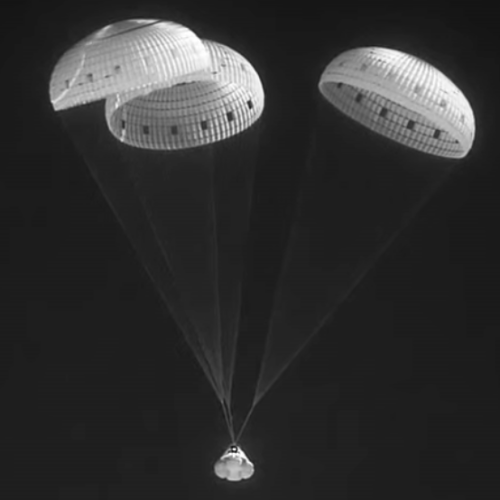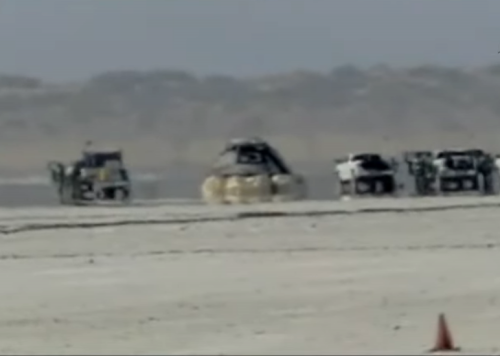Starliner successfully lands in New Mexico

Capitalism in space: Boeing today successfully completed the safe landing of Starliner from an unmanned demo mission to ISS, making it the only American capsule to touchdown on the ground using parachutes. This was the second Starliner to do so, though the first demo mission was cut short just after reaching orbit.
The screen capture to the right comes from the live stream, about two minutes before touchdown. You can see the airbags deployed under the capsule, which inflated just after the heat shield was jettisoned.
The capsule landed only 0.3 miles from its target, an excellent result. Crews are now heading to the capsule at White Sands to carefully check it out, to make sure no hazardous fuel leaks pose a threat to those ground crews.
I must complement Boeing (and NASA) on providing very professional coverage. It has often been painful in recent years to watch any NASA broadcast because of the breathless propaganda the agency has somehow thought it needed to do. In this case however the announcers and the broadcast were calm, thoughtful, and very informative, focused not on emotion but on reporting what was actually happening. Kudos to Boeing!

The second image to the right is especially significant, as it shows the recovery crews shortly after they had arrived by vehicle. For Boeing this gives it a distinct advantage over SpaceX’s Dragon capsules, which splashes down in the ocean. On the ground things will go much faster, and be much safer.
On Christmas Eve 1968 three Americans became the first humans to visit another world. What they did to celebrate was unexpected and profound, and will be remembered throughout all human history. Genesis: the Story of Apollo 8, Robert Zimmerman's classic history of humanity's first journey to another world, tells that story, and it is now available as both an ebook and an audiobook, both with a foreword by Valerie Anders and a new introduction by Robert Zimmerman.
The print edition can be purchased at Amazon or from any other book seller. If you want an autographed copy the price is $60 for the hardback and $45 for the paperback, plus $8 shipping for each. Go here for purchasing details. The ebook is available everywhere for $5.99 (before discount) at amazon, or direct from my ebook publisher, ebookit. If you buy it from ebookit you don't support the big tech companies and the author gets a bigger cut much sooner.
The audiobook is also available at all these vendors, and is also free with a 30-day trial membership to Audible.
"Not simply about one mission, [Genesis] is also the history of America's quest for the moon... Zimmerman has done a masterful job of tying disparate events together into a solid account of one of America's greatest human triumphs."--San Antonio Express-News

Capitalism in space: Boeing today successfully completed the safe landing of Starliner from an unmanned demo mission to ISS, making it the only American capsule to touchdown on the ground using parachutes. This was the second Starliner to do so, though the first demo mission was cut short just after reaching orbit.
The screen capture to the right comes from the live stream, about two minutes before touchdown. You can see the airbags deployed under the capsule, which inflated just after the heat shield was jettisoned.
The capsule landed only 0.3 miles from its target, an excellent result. Crews are now heading to the capsule at White Sands to carefully check it out, to make sure no hazardous fuel leaks pose a threat to those ground crews.
I must complement Boeing (and NASA) on providing very professional coverage. It has often been painful in recent years to watch any NASA broadcast because of the breathless propaganda the agency has somehow thought it needed to do. In this case however the announcers and the broadcast were calm, thoughtful, and very informative, focused not on emotion but on reporting what was actually happening. Kudos to Boeing!

The second image to the right is especially significant, as it shows the recovery crews shortly after they had arrived by vehicle. For Boeing this gives it a distinct advantage over SpaceX’s Dragon capsules, which splashes down in the ocean. On the ground things will go much faster, and be much safer.
On Christmas Eve 1968 three Americans became the first humans to visit another world. What they did to celebrate was unexpected and profound, and will be remembered throughout all human history. Genesis: the Story of Apollo 8, Robert Zimmerman's classic history of humanity's first journey to another world, tells that story, and it is now available as both an ebook and an audiobook, both with a foreword by Valerie Anders and a new introduction by Robert Zimmerman.
The print edition can be purchased at Amazon or from any other book seller. If you want an autographed copy the price is $60 for the hardback and $45 for the paperback, plus $8 shipping for each. Go here for purchasing details. The ebook is available everywhere for $5.99 (before discount) at amazon, or direct from my ebook publisher, ebookit. If you buy it from ebookit you don't support the big tech companies and the author gets a bigger cut much sooner.
The audiobook is also available at all these vendors, and is also free with a 30-day trial membership to Audible.
"Not simply about one mission, [Genesis] is also the history of America's quest for the moon... Zimmerman has done a masterful job of tying disparate events together into a solid account of one of America's greatest human triumphs."--San Antonio Express-News


Yay Boeing!!!
Despite all the screwups you managed to do the right thing.
Congratulations to all the hard working engineers, technician and administrative types and everyone else that contributed to this effort.
Fixing stuff is hard.
I hope Starliner can find a place in the future.
Isi it the second one? The first Starliner test landed that way too.
Not sure of the airbag advantage. Starliner ditches the heat shield. Look out below!!! Dragon reuses the heat shield. Safer maybe, in planed descent where you can plan and pick your target. I personally would rather land on a nice flat solid surface and have a nice limo ride to the nearest bar but sometimes you may not have a choice.
I wonder if a Dragon crew could survive a solid landing.
While New Shepard isn’t orbital and doesn’t have to deal with a heat shield, I think it still deserves some credit for successful manned landings on dry ground.
Should be remembered (IIRC) that SpaceX originally planned for Dragon to land on the ground using retro rockets. but NASA had safety concerns so they went with the more conservative water landings.
LTC SDS: You are right. I forgot about that first demo mission. I have edited the post, correcting it.
We needed some good news,
“ On the ground things will go much faster, and be much safer.”
Only if those airbags consistently deploy, or mostly deploy. Recall they had a chute failure on one of their test drops—I suppose since there are multiple airbags they could have a few fail and still be OK. Still, it’s additional critical pyro deployment events that Dragon doesn’t have. But they are on dry land—seems like an even trade risk-wise.
Colliding with water, at speed, is similar to hitting land as water is non compressible in nature. Whatever modality Elon decides is best for SpaceX will be fascinating to watch. I’m of the opinion that the deciding factor between water or land returns should be guided by safety.
t-dub,
Stating safety is the “guiding factor” is easy. Do you care to elaborate? How do you stack up the risks as you perceive them between water and land touchdowns? Are you going to consider single or multiple points of failure? Site availability due to adverse conditions.? Emergencies?
Elon’s decision was the result of a process where he had to consider safety along with cost. How much does safety cost?
I’m am really not trying to be antagonistic but saying that “safety” is the dominant factor in decision making needs to be filled out a little. A lot of people embrace the same type of thinking and I really don’t understand how they feel comfortable to say such things. Is this a really considered opinion? How does this work in practice?
Are you aware that Starship as planned has no emergency escape system? And a failure in one of multiple interacting systems during a broomstick handing results in the death of the crew (which is going to happen eventually because nothing is really “perfectly safe”)? How does safety come into play in these circumstances? Should Elon abandon his plans because they aren’t safe?
I’m honestly interested in how you see these things. Anyone else, please feel free to chime in.
Pawn,
Starship as a pure cargo vessel represents such a leap forward in capability that it could operate for years before considered human rated. On the other hand NASA has it planned as a manned lunar lander and that application has no parachute or winged landing possible.
StarShip could operate for many years without being human-rated for launch and landing.
Not only could it make many unmanned flights as a sat deployment vehicle, but the manned variants operating on the Moon would have no atmosphere for parachutes.
Finally, capsules and reusable boosters provide an alternative to transfer crew between LEO and Earth’s surface, avoiding the need for crewed ships to either launch or land.
I was hoping it would land in the Willcox Playa (Cochise County, AZ) instead of White Sands. Maybe next time.